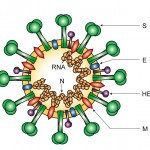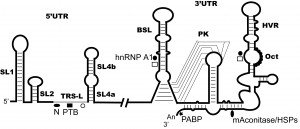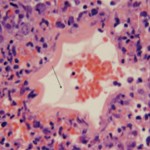 The replication of the murine coronavirus MHV (mouse hepatitis virus) and the molecular and genetic basis of its interactions with the host are being studied. Coronaviruses are important human pathogens causing a broad range of diseases depending on the particular virus and host system examined. Human diseases associated with coronaviruses include SARS (severe acute respiratory syndrome), MERS (Middle East Respiratory Syndrome), less severe lower and upper respiratory disease, and gastroenteritis. MHV produces a broad spectrum of disease in the mouse, and provides excellent small animal models for hepatitis, for SARS, and for multiple sclerosis. We have two projects in the laboratory.
The replication of the murine coronavirus MHV (mouse hepatitis virus) and the molecular and genetic basis of its interactions with the host are being studied. Coronaviruses are important human pathogens causing a broad range of diseases depending on the particular virus and host system examined. Human diseases associated with coronaviruses include SARS (severe acute respiratory syndrome), MERS (Middle East Respiratory Syndrome), less severe lower and upper respiratory disease, and gastroenteritis. MHV produces a broad spectrum of disease in the mouse, and provides excellent small animal models for hepatitis, for SARS, and for multiple sclerosis. We have two projects in the laboratory.
 The first project is focused on identifying evolutionarily conserved RNA secondary structures in the coronavirus RNA genome and functionally examining their role in viral replication through reverse genetic and biochemical approaches. We have previously done this for a number of RNA secondary structures contained within the 5′ and 3′ regions of the genome and shown that they function as cis-acting elements in replication. Studies in my laboratory have identified a structurally dynamic region of the 5’UTR that interacts with the 3’UTR to facilitate transcription.
The first project is focused on identifying evolutionarily conserved RNA secondary structures in the coronavirus RNA genome and functionally examining their role in viral replication through reverse genetic and biochemical approaches. We have previously done this for a number of RNA secondary structures contained within the 5′ and 3′ regions of the genome and shown that they function as cis-acting elements in replication. Studies in my laboratory have identified a structurally dynamic region of the 5’UTR that interacts with the 3’UTR to facilitate transcription.
 A second project in my laboratory has been to develop a reverse genetic system for MHV-1. In collaboration with investigators in Toronto and Pennsylvania my laboratory has demonstrated that MHV-1 infection of susceptible mice provides a safe and convenient rodent model for severe coronavirus infections such as SARS and MERS. The development of a reverse genetic system will allow us to investigate the contributions of individual viral genes to the pathogenesis of the severe pulmonary disease caused by this virus.
A second project in my laboratory has been to develop a reverse genetic system for MHV-1. In collaboration with investigators in Toronto and Pennsylvania my laboratory has demonstrated that MHV-1 infection of susceptible mice provides a safe and convenient rodent model for severe coronavirus infections such as SARS and MERS. The development of a reverse genetic system will allow us to investigate the contributions of individual viral genes to the pathogenesis of the severe pulmonary disease caused by this virus.